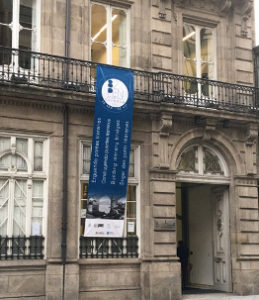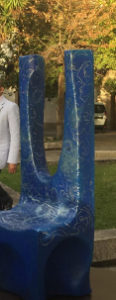Building Literary Bridges: Past and Present
Gathered in the ancient city of Ourense, Spain in the heart of Galicia, writers from around the world celebrated history, debated the present and committed to the future of literature and freedom of expression at PEN International’s 82nd Congress organized around the theme “Building Literary Bridges.”


Two hundred poets, novelists, dramatists and nonfiction writers from approximately 75 centers of PEN agreed to embark on a three-year global campaign to increase opportunities for displaced writers worldwide. Responding to the unprecedented flow of refugees, migrants, and displaced, all of which include writers and those whose stories need to be told, the 95-year old literary organization will undertake an initiative to put storytelling and literature at the center of an effort to heal and expand opportunities. Through its 145 centers, PEN will develop programs that will include residencies, workshops, mentoring, education and publications. The full scope of the campaign will be announced December 10, Human Rights Day.
Founded in 1921 out of the chaos and refugee flows after World War I, PEN anticipated and protested the suppression of freedom of expression in Nazi Germany prior to World War II and defended writers throughout Europe during the war, offering haven and setting up PEN centers in exile.
“PEN responds to the crises of our times,” said PEN International President Jennifer Clement. “We are writers. We believe in imagination.”
The 82nd Congress began with heartening and dispiriting news. Iranian-Canadian writer Homa Hoodfar was released from Iran’s Evin prison at the same time news arrived that Jordanian columnist Nahed Hattar had been gunned down outside court by a fundamentalist who claimed Nahed deserved to die for his ideas.
This pattern of good and terrible news also emerged in the past year with early releases of imprisoned writers in Tibet, Kazakhstan, Azerbaijan, Vietnam, Qatar and Colombia at the same time the situation deteriorated with more arrests and killings in Bangladesh, China, Turkey, Ukraine and other countries.
The tradition of an Empty Chair at the PEN Congress sessions highlighted the cases of imprisoned Egyptian novelist Ahmed Naji, Kurdish journalist Asli Erdogan, Palestinian poet Dareen Tatour, and Gui Minhai, a bookseller in Hong Kong, who was kidnapped by the Chinese government while he was in Thailand.
Gui’s daughter, a Swedish citizen as is he, sent a letter to the Congress: “In the end, this is not about my father as an individual…. This is about China actively extending its control far beyond its own borders. This is about China kidnapping and illegally detaining more and more people because of their political beliefs. It’s about European citizens no longer being able to know that their human rights will be protected.”
Discussing “Literature as a Tool for Empowerment,” delegates shared ongoing projects, including working with young writers in schools and in prisons. Lebanon PEN Center’s delegate noted, “I discovered the tremendous effect from creative writing to express trauma and help people tell their stories. We have 1.3 million Syrians in Lebanon. We have a big responsibility. We see the empowerment of civil society through literature.”
In Mali and Sierra Leone, the PEN centers work with students and young people in post-conflict situations. The Mali delegate spoke about workshops with Tuareg warriors who had fought on the battlefield in the Sahara. When they returned home, they had lost their dignity and positions and were migrants so they went to join the ranks of Gadhafi. After Gadhafi was toppled, there was a big problem, he said, and conflict. The Mali PEN Center helped organize writing workshops which led to publishing books. Hundreds attended these workshops and were able to tell their stories and see them published.
PEN’s earliest work to protect writers began when poet Federico Garcia Lorca was arrested at the beginning of the Spanish Civil War in 1936. PEN President H.G. Wells sent a telegram protesting, but it arrived too late and Lorca was executed. At the 82nd PEN Congress, Lorca’s niece Laura opened the Assembly with Lorca’s poem Sonnet:
I know that my profile will be serene
In the north of an unreflecting sky.
Mercury of vigil, chaste mirror
to break the pulse of my style.
For if ivy and the cool of linen
are the norm of the body I leave behind,
my profile in the sand will be the old
unblushing silence of a crocodile.
And though my tongue of frozen doves
will never taste of flame,
only of empty broom,
I’ll be a free sign of oppressed norms
on the neck of the stiff branch
and in an ache of dahlias without end.
–Federico Garcia Lorca
Thank you Joanne for this report on the conference in Ourense. Our future is our youth and that includes all the immigrants and displaced persons, but also those many, many young people who are in jail in the USA.
Incarceration worldwide is the fear maker, the word blocker, the democracy eraser.
We must, we will continue to fight for freedom of expression . Gracias. ES
Wow! Thank you for bringing PEN International’s 82nd Congress to life for us with your examples of PEN’s remarkable history — and future! The powerful voices of writers are needed to connect the rest of us with both successes and urgent needs around the world. Bravo for PEN’s three-year global campaign. What a timely response to give voice to displaced writers — and to keep their causes front and center.
I always appreciate your thoughtful reporting and story-telling posts. Merci beaucoup!
Joanne,
I was really moved and interested by your account. I haven’t been to Congress since the one in Berlin.
It’s good to know that the younger generation are picking up where many of us left off.
All the best Joanne.
Thank you for sending your post on the Pen Congress; it very aptly ends on the beautiful poem of Garcia Lorca. I feel that Aleppo is our Guernica, and there are eerie parallels between the Spanish civil War and what is happening in Syria.
Thank you for this useful report, which compensated me for some sense of sorrow for the lack of my participation in the conference due to the delay of visa for Spain. It is regrettable that some feeling of hostility towards the Arab peoples extends to everyone, although they are the first victims of the erroneous policies of the governments , and writers in particular are standing in the first row to resist tyranny and oppression, which force some people to emigrate from their homelands and resort to other countries.
As Clement said we writers believe in imagination, so I always imagine the misery and travail, in which refugee families live, including writers, poets, young and talented, but their talent is either drowned into the sea or disappear by neglegence and starvation.
Well done that Pen organization put emphasis on the of immigrants and exiles ,a problem faced by mankind since centuries and did not find resistance and rejection as today from some politicians.
Greetings and thanks again.
Thank you for this useful report, which compensated me for some sense of sorrow for the lack of my participation in the conference due to the delay of visa for Spain. It is regrettable that some feeling of hostility towards the Arab peoples extends to everyone, although they are the first victims of the erroneous policies of the governments , and writers in particular are standing in the first row to resist tyranny and oppression, which force some people to emigrate from their homelands and resort to other countries.
As Clement said we writers believe in imagination, so I always imagine the misery and travail, in which refugee families live, including writers, poets, young and talented, but their talent is either drowned into the sea or disappear by neglegence and starvation.
Well done that Pen organization put emphasis on the of immigrants and exiles ,a problem faced by mankind since centuries and did not find resistance and rejection as today from some politicians.
Greetings and thanks again.